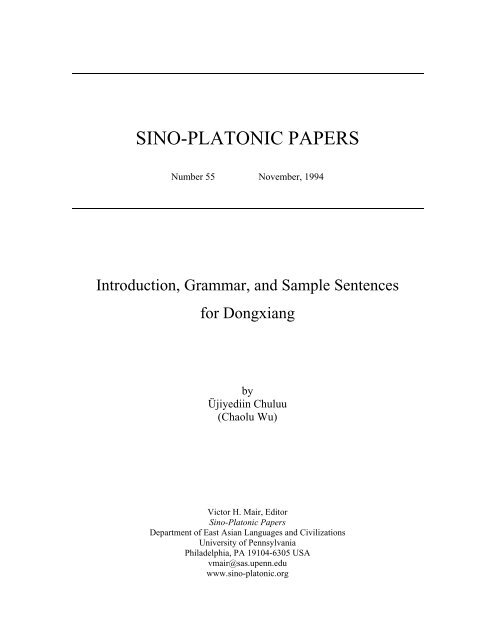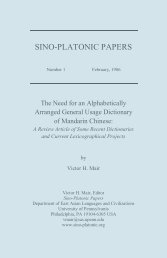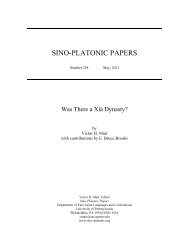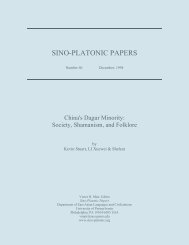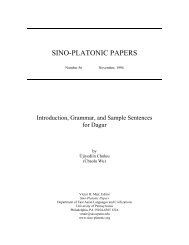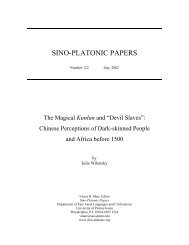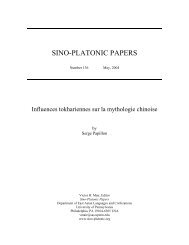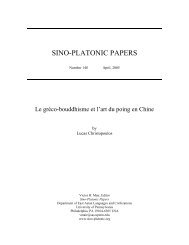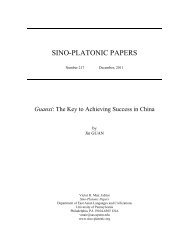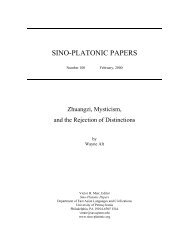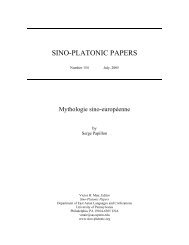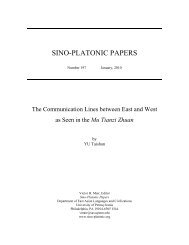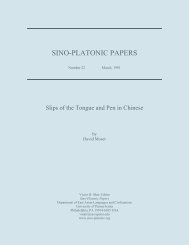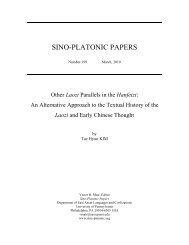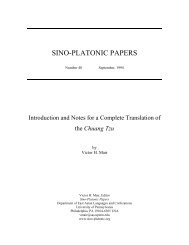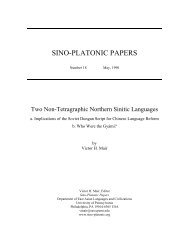Introduction, Grammar, and Sample Sentences for Dongxiang
Introduction, Grammar, and Sample Sentences for Dongxiang
Introduction, Grammar, and Sample Sentences for Dongxiang
You also want an ePaper? Increase the reach of your titles
YUMPU automatically turns print PDFs into web optimized ePapers that Google loves.
SINO-PLATONIC PAPERS<br />
Number 55 November, 1994<br />
<strong>Introduction</strong>, <strong>Grammar</strong>, <strong>and</strong> <strong>Sample</strong> <strong>Sentences</strong><br />
<strong>for</strong> <strong>Dongxiang</strong><br />
by<br />
Üjiyediin Chuluu<br />
(Chaolu Wu)<br />
Victor H. Mair, Editor<br />
Sino-Platonic Papers<br />
Department of East Asian Languages <strong>and</strong> Civilizations<br />
University of Pennsylvania<br />
Philadelphia, PA 19104-6305 USA<br />
vmair@sas.upenn.edu<br />
www.sino-platonic.org
SINO-PLATONIC PAPERS is an occasional series edited by Victor H. Mair.<br />
The purpose of the series is to make available to specialists <strong>and</strong> the interested<br />
public the results of research that, because of its unconventional or controversial<br />
nature, might otherwise go unpublished. The editor actively encourages younger,<br />
not yet well established, scholars <strong>and</strong> independent authors to submit manuscripts<br />
<strong>for</strong> consideration. Contributions in any of the major scholarly languages of the<br />
world, including Romanized Modern St<strong>and</strong>ard M<strong>and</strong>arin (MSM) <strong>and</strong> Japanese, are<br />
acceptable. In special circumstances, papers written in one of the Sinitic topolects<br />
(fangyan) may be considered <strong>for</strong> publication.<br />
Although the chief focus of Sino-Platonic Papers is on the intercultural relations of<br />
China with other peoples, challenging <strong>and</strong> creative studies on a wide variety of<br />
philological subjects will be entertained. This series is not the place <strong>for</strong> safe, sober,<br />
<strong>and</strong> stodgy presentations. Sino-Platonic Papers prefers lively work that, while<br />
taking reasonable risks to advance the field, capitalizes on brilliant new insights<br />
into the development of civilization.<br />
The only style-sheet we honor is that of consistency. Where possible, we prefer the<br />
usages of the Journal of Asian Studies. Sinographs (hanzi, also called tetragraphs<br />
[fangkuaizi]) <strong>and</strong> other unusual symbols should be kept to an absolute minimum.<br />
Sino-Platonic Papers emphasizes substance over <strong>for</strong>m.<br />
Submissions are regularly sent out to be refereed <strong>and</strong> extensive editorial<br />
suggestions <strong>for</strong> revision may be offered. Manuscripts should be double-spaced with<br />
wide margins <strong>and</strong> submitted in duplicate. A set of "Instructions <strong>for</strong> Authors" may<br />
be obtained by contacting the editor.<br />
Ideally, the final draft should be a neat, clear camera-ready copy with high black<strong>and</strong>-white<br />
contrast.<br />
Sino-Platonic Papers is licensed under the Creative Commons Attribution-<br />
NonCommercial-NoDerivs 2.5 License. To view a copy of this license, visit<br />
http://creativecommons.org/licenses/by-nc-nd/2.5/ or send a letter to Creative<br />
Commons, 543 Howard Street, 5th Floor, San Francisco, Cali<strong>for</strong>nia, 94105, USA.<br />
Please note: When the editor goes on an expedition or research trip, all operations<br />
(including filling orders) may temporarily cease <strong>for</strong> up to two or three months at a<br />
time. In such circumstances, those who wish to purchase various issues of SPP are<br />
requested to wait patiently until he returns. If issues are urgently needed while the<br />
editor is away, they may be requested through Interlibrary Loan.<br />
N.B.: Beginning with issue no. 171, Sino-Platonic Papers has been published<br />
electronically on the Web. Issues from no. 1 to no. 170, however, will continue to<br />
be sold as paper copies until our stock runs out, after which they too will be made<br />
available on the Web at www.sino-platonic.org.<br />
_______________________________________________
Sino-Platonic Papers, 55 (November, 1994)<br />
<strong>Introduction</strong>, <strong>Grammar</strong>, <strong>and</strong> <strong>Sample</strong> <strong>Sentences</strong> <strong>for</strong> <strong>Dongxiang</strong><br />
~ji~ediin<br />
Chuluu<br />
(Chaolu Wu)<br />
University of Toronto
I. <strong>Introduction</strong><br />
The following materials have been translated <strong>and</strong> edited by the author based on<br />
three books: <strong>Dongxiang</strong> kele ba Mong;yol kele [<strong>Dongxiang</strong> <strong>and</strong> Mongolian Languages],<br />
<strong>Dongxiang</strong> kelen-ii iige kelelge-yin materiyal [Language Materials <strong>for</strong> <strong>Dongxiang</strong>], <strong>and</strong><br />
<strong>Dongxiang</strong> kelen-ii uges [Vocabularies of <strong>Dongxiang</strong> Languages] written by Boke in<br />
Institute <strong>for</strong> Mongolian language Studies, The University of Inner Mongolia, Huhhot,<br />
Inner Mongolia. The materials consist of the following four parts, <strong>Introduction</strong>, Basic<br />
<strong>Grammar</strong>, Sentence, <strong>and</strong> Selected Bibliographes in Chinese, English, Mongolian.<br />
<strong>Dongxiang</strong> language is spoken by a minority people in the northwestern territory of<br />
China. The total population of the <strong>Dongxiang</strong> is around 27900 <strong>and</strong> more than half of the<br />
population live in <strong>Dongxiang</strong> County, Lingxia Hui Autonomous Prefecture, Gansu<br />
province <strong>and</strong> there are also a small number of people live in other regions of Gansu, such<br />
as, Guanghe County, Hezheng County, Linxia County, Kangle County of Lingxia Hui<br />
Autonomous Prefecture. <strong>Dongxiang</strong> people are used to be called 'Mongol Qotung' or<br />
'<strong>Dongxiang</strong> Qotung', but it is called <strong>Dongxiang</strong> since the 1950s. The word Doilgxiang<br />
means 'East town or East village' which originated because the area <strong>Dongxiang</strong> people<br />
inhabiting located the eastern side of Hezhou. l<br />
<strong>Dongxiang</strong> language belongs to the Mongolic branch of Altaic languages <strong>and</strong> shares<br />
many phonological, morphological, <strong>and</strong> syntactical similarities with the other languages of<br />
the Mongolian languages. <strong>Dongxiang</strong> language is divided into three subdialects:<br />
Suonanba, Wangjiaji, <strong>and</strong> Sijiaji etc. The books mentioned above are written mostly<br />
basing on Suonanba subdialect.<br />
abl.<br />
cau.<br />
dat.<br />
i tp.<br />
impf.<br />
neg.<br />
pos.<br />
pst.<br />
ter.<br />
Ablative<br />
Causative<br />
Dative<br />
Lnterrogative<br />
Imperfective<br />
Negative<br />
Possessive<br />
Past<br />
Terminal<br />
l~oke (1987: 7-8) <strong>and</strong> Liu (1981 : 1).<br />
Abbreviation<br />
acc. Accusative<br />
con. Conditional<br />
fin. Final<br />
inst. Instrumental<br />
gen. Genitive<br />
pef. Perfective<br />
prg . Progressive<br />
ref. Reflective<br />
aux.<br />
corn.<br />
hab.<br />
imf.<br />
npt.<br />
PI.<br />
ptl.<br />
rec.<br />
Auxiliary<br />
Comitative<br />
Habitual<br />
Imperative Form<br />
Non-past<br />
Plural<br />
Particle<br />
Reciprocal
11. <strong>Grammar</strong><br />
1. Vowel<br />
There are seven short vowels in <strong>Dongxiang</strong>, such as, [a], [a], [i], [m], [o], [u], [w]<br />
<strong>and</strong> nine diphthongs [ail, [ ail, [ui] [au], [ au], [ia], [ia 1, [iu] [ua].<br />
1.1 Short Vowel<br />
The examples<br />
[a] <strong>and</strong>a 'friend' [a] <strong>and</strong>a 'here'<br />
[i] ima~ 'goat' ['JJl quwu 'frost'<br />
[o] boro 'gray' [u] buru 'mistake'<br />
[s] i 'twenty"<br />
1.2 The Description of Simple Vowel<br />
[a] Low back unrounded vowel. [a] Mid central unrounded vowel.<br />
[i] High front unrounded vowel. [w] High back unrounded vowel.<br />
[0] Mid central rounded vowel. [u] High back rounded vowel.<br />
1.3 Diphthongs<br />
[ail qaiei 'scissorsr [ail failia- 'blow'<br />
[ui] kuit~ia n 'cold' [au] sau- 'sit'<br />
[au] daura 'under' [ia] nim- 'paste'<br />
[ia] gia 'house' [iu] niu- 'to hide'<br />
[ua] ua 'two'<br />
2. Consonants<br />
<strong>Dongxiang</strong> has the following 28 consonants, [b], [p], [dl, [t], [g], [k], [GI, [q],<br />
[dzI, [&I, [@I 3 [@I, [GI, [fl, [sI, [$I 3 [GI, [XI [hI. [wI [TI, UI, [[my [nI, [gI, [I],<br />
[rl<br />
2.1 The contrast of consonants<br />
[b] bau- 'comedown' [PI PaU 'gun'<br />
[dl dm- 'to follow' [t] tam- 'dismiss'<br />
[g] gian 'sickness' [k] kian 'who'<br />
[q] quru- 'fry' [GI Guru 'finger'<br />
[&I &a- 'sue' [@I @a 'tea'<br />
[a] &ig 'scripture' [GI Gig 'that way'<br />
[fl failia 'blow' [w] w ~ a 'wash'<br />
*[el mostly occurs in Chinese loan word.
[?I ~ira 'yellow'<br />
[GI pira 'under'<br />
[x] xulq 'red'<br />
[E] no~i<br />
[m] mau 'bad'<br />
[g] jarjdzi 'shape'<br />
[r] narq 'sun'<br />
2.2 The description of consonants<br />
[z] ~auji- 'rub'<br />
[s] sira- 'cut off<br />
[hI haroy] 'ten'<br />
bl ja 'what'<br />
[n] nau- 'to hit a target'<br />
[I] laWy] 'leaf'<br />
[dz] badza 'town'<br />
b] Bilabial unaspirated plosive [p] Bilabial aspirated plosive.<br />
[dl Alveolar unaspirated plosive [t] Alveolar aspirated plosive.<br />
[g] Velar unaspirated plosive<br />
[GI Uvular unaspirated plosive<br />
[k] Velar aspirated plosive.<br />
[q] Uvular aspirated plosive.<br />
[dz] Alveolar unaspirated affricative [el Postal alveolar unaspirated affricative.<br />
[Q] Postal alveolar aspirated affricative [a] Palatal unaspirated affricative.<br />
[Q] Palatal aspirated affricative [fl Labiodental voiceless fricative.<br />
[s] Alveolar voiceless fricative [$I Retroflex unaspirated fricative.<br />
[GI Retroflex aspirated fricative [x] Velar voiceless fricative.<br />
[h] Glottal voiceless fricative<br />
[q] Retroflex voiced fricative<br />
[I(] Uvular voiced fricative<br />
[n] Alveolar nasal<br />
[w] Bilabial voiced fricative.<br />
Ij] Palatal approximant.<br />
[m] Bilabial nasal<br />
[q] Velar nasal.<br />
[l] Alveolar lateral approximan t [r] Alveolar approximant.<br />
3. Plural Suffixes<br />
Suffix Condition<br />
-la any noun<br />
Examples<br />
~oni 'sheep1 eoni-la 'sheep'<br />
-sla/-sila certain noun <strong>and</strong> pronoun o@in 'girl' o~in-sla 'girls'<br />
-pi only noun indicating relatives gajieiau 'brother' gajieiau-pi 'brothers'<br />
4. Case Suffixes<br />
Case Suffix Examples Translation<br />
Nominative -0 uidyia n 'door'<br />
Genitive & accusative -nil-ji uiGian-ni 'of door'<br />
Dative -da uidyian-da 'at door'<br />
Instrument a1 -tala uiQian-~ala 'with door'<br />
Ablative -sa uiaian-sa 'from door'<br />
Cornitative -la uieian-la 'with door'
Directive<br />
Locative<br />
-W-GU!I uiaian-m.q 'toward door'<br />
-m uiian- 'at door'<br />
5. Possessive Suffix<br />
5.1 Possessive Suffix<br />
Suffix Example Translation<br />
1st Singular -d-miJi gaji-mini 'my older brother'<br />
Plural -bidpinni/-biwiji (Exc.) gaji-bi inni 'our older brother'<br />
-matanpl/-mani (Inc.) gaj i-mani 'our older brother'<br />
2nd Singular -@ini/-~ij i gaji-~ini 'your older brother'<br />
Plural -tani<br />
gaj i- tani 'your older brother'<br />
3rd -ni<br />
gaji-ni 'His (their) older brother'<br />
5.2 Reflexive-possessive Suffix -na<br />
6. Voice Form<br />
Voice Suffix Examples<br />
Active -0 at$-<br />
I I<br />
boo opi- 'see'<br />
Causative -m, -ulu a~i-rn 'let go' opi-m 'let read'<br />
Reciprocal -ndu, -n@ aei-ndu 'go together' ogi-ndu 'read together'<br />
7. Imperative Form<br />
Suffix<br />
Voluntative -ja<br />
Imperative -0<br />
Permissive -gia<br />
8. Tense <strong>and</strong> Aspect Suffix<br />
Non-past -na/-mu<br />
Past -wo<br />
9. Verbal Noun Suffix<br />
Perfective -san<br />
Imperfective -ku/-wu<br />
Habitual<br />
10. Converbal Suffix<br />
Imperfective -&i<br />
Perkc tive -da na/-da<br />
Example<br />
ira -ja<br />
ira -na<br />
ira-wo<br />
ira-san
Model<br />
Find<br />
Conditional<br />
Concessive<br />
Terminal<br />
ira -n<br />
ira -la<br />
im-sa<br />
ira -sanu<br />
h -tala
111. <strong>Sentences</strong><br />
The sentences listed below are all from Boke (1987, pp. 3-5 1). Originally, they are<br />
<strong>Dongxiang</strong> sentences with interlinear transcription in Mongolian <strong>and</strong> Chinese translation.<br />
Here the examples begin in a romanization of <strong>Dongxiang</strong>, then they are in interlinear<br />
transcription <strong>and</strong> translation in English.<br />
1. ana 3i3jq wo?<br />
this be what AUX<br />
What is this?<br />
2. ana si mini gu4 wo<br />
this be my book AUX<br />
This is my book.<br />
3. ha ~i nia b<strong>and</strong>zi5 gu wo. einuq wo nu?<br />
that be one book book~ux yours AUX rrp<br />
That is a book. Is that yours?<br />
4. pugi wo. min- pwi wo. ha ~i ~ i n wo q<br />
NEG AUX mine NEG AUX that be yours AUX<br />
No, it is not mine, it's yours.<br />
5. ana ~i nia b<strong>and</strong>zi =;u wo nu?<br />
this be one book book AUX ITP<br />
Is this a book?<br />
6. pqi wo. ha gi nia bidqiban6 wo. ha gi mini bidqiban wo<br />
~u; AUX that be one notebook AUX that be my notebook AUX<br />
No, that is not a book, That is my notebook.<br />
7. ~i gi kian wo?<br />
you be who AUX<br />
Who are you?<br />
8. bi 3i ~ia-rj7 wo. mini niara gi Tuja wo.<br />
I be student AUX my name be Tujaa AUX<br />
I am a student <strong>and</strong> my name is Tuyaa.<br />
9. ha nia oGdai kuy] ja~i* da ~iagag anbai-n-u?<br />
that one female person also m student AUX--W-ITP<br />
Is that woman also student<br />
3~hinese. Shi.<br />
4~hinese. Shu.<br />
5~hinese. Benzi.<br />
khinese. Bijiben.<br />
7~hinese. Xueshertg.<br />
khinese. Yeshi.
10. p ~ i wo. tam gi pwi wo. tam gi nia laqi9 wo.<br />
NEG AUX she be NEG AUX she be one teacher AUX<br />
No, she is not, she is a teacher.<br />
1 1. ha nia k q laqi pqi wo olu-dqi wo-u?<br />
that one person teacher NEG AUX right-IMPF AUX-ITP<br />
He is not teacher, right?<br />
12. olu-dqi wo. tam si la~i pwi wo ha nia nitugdq10 jasi da<br />
right-IMPF AUX he be teacher NEG AUX that one female also rn<br />
la~i pwi wo<br />
teacher NEG AUX<br />
You are right, he is not a teacher <strong>and</strong> neither is she.<br />
13. ha kq-la 3 jag k q wo?<br />
that person-PL be what person AUX<br />
Who are they?<br />
14. bi ulia mac@ia-na, ha-la kqpal ~i lawi bi-mu ~iasg pa-sa<br />
I NEG know-NP~ he-PL perhaps be teacher be-m student be-co~<br />
I don't know whether they are teachers or students.<br />
15. anadzi-qgi ~ini dun~il* wonu?<br />
this all-PL be your thing-PL be ITP<br />
Do these all your belongings?<br />
16. anadzi-mq dupi dunda adzi-q nia gi minuwg wo adzi-mr~ nia 2i<br />
this-PL thing among these-PL one be mine AUX these-PL one be<br />
mini gaganmy] wo<br />
my brother's AUX<br />
Some of these things are mine <strong>and</strong> some of them are my elder brother's.<br />
1 7. ana nia guq13 ~udusurj ~i rninq ja pwi wo, mini gaganuwy) ja<br />
this one pair boot be mine FTLNEG AUX my brother a~<br />
pwi wo, kianuwrl] pa-sa ulia madyia-na<br />
NEG AUX whose be-co~ hm know -Nm<br />
This pair of boots is not mine <strong>and</strong> it is not my elder brother's too. I don't know whose it is.<br />
18. @ qutdai-ni kialia mad;lia-n-u?<br />
you Chinese-ACC speak know-NIT-ITP<br />
Can you speak Chinese?<br />
19. olu-&i wo. bi qudai-ni adzhug nia kialia maaia-na<br />
right-IMPF AUX 1 Chinese-ACC little one speak know-NPT<br />
Yes, I speak little bit<br />
9~hinese. Laoshi.<br />
O~hinese. Niitorzgzhi.<br />
~hinese. Kongpa.<br />
2~hinese. Dongxi.<br />
Shuang.<br />
3~hinese.
20. 4ni biari-~ini qudai kialia mad@-n-u?<br />
your wife-POS Chinese language know-m-ITP<br />
Can your wife speak Chinese?<br />
ulia ma @ia -na , ta ra ulia ma Gia-na . tara dqisi l4 bidqia -ni a na torodu<br />
NEG know-NPT she NIX know-NPT she only weGEN this place<br />
kialian kialia maGia-na<br />
language speak know-NP~<br />
No, she cannot, she can speak only our language.<br />
ada-~iini qala wo?<br />
father-POS where A U ~<br />
Where is your father?<br />
ada-mini gia-da wo. ana-mini ja gia-da wo<br />
father-POS home-DAT AUX mother-P~S also home-DAT AUX<br />
My father is at home <strong>and</strong> my mother is also at home.<br />
~ dugi-la-ni qala tai-wo?<br />
you thing-~~-A~~ where put-PST<br />
Where did you put your things?<br />
ieia-ku dwi-la ~ugui-da wo, jun@i-ku dwi-la ~ira Giara wo<br />
eat-IMPF thng-PL cupboard-DAT AUX use-IMPF thing-PL table on A~JX<br />
The food is in the cupboard <strong>and</strong> things <strong>for</strong> use are on the table.<br />
<strong>and</strong>a c;ua idzi15 wai-n-u?<br />
here two chair exist-m-rr~<br />
Are there two chairs here?<br />
p ~ wo, i cua p ~ wo, i ourq idzi wo.<br />
NEC; AUX two rn AUX three chair AUX<br />
No, they are not two, but three chairs.<br />
~irna-da ~iaja wai-n-u?<br />
you-DAT tea have-NPT-rr'p<br />
Do you have tea?<br />
olu-dqi wo, ma-da wja wai-na ma aharj tor0 tai-dp<br />
right-IMPF AUX me-DAT tea have-NPT but where in put-IMPF<br />
pa-sa bi ulia maaia-na<br />
be-CON 1 NEG know-NFT<br />
Yes, I have, but I don't know where it is.<br />
~ima-da xaitq wai-n-u?<br />
you-DAT black sugar have-m-rr~<br />
Do you have brown sugar?<br />
14chinese. Zhishi.<br />
5~hinese.<br />
Yizi.
3 1. u wo ma-da xaitarj u wo, ma-da baitag wai-na<br />
NEG AUX I-DAT black sugar NEG AUX I-OAT white sugar have-m<br />
No. I don't have: I have white sugar.<br />
anudu gi jag udu wo?<br />
today be what day AUX<br />
What is the date today?<br />
anudu gi i@iu balqman-ni baja jixau-ni ~iqt~iwul6 wo<br />
today be nineteen eighty-GEN August fi~st-~~~<br />
The today is Friday, August 1, 1980.<br />
~i 3i jag ~iaia-da olu-san wo<br />
YOU be what ~~E-DAT get-PEF AUX<br />
Friday AM<br />
When were you born in?<br />
bi ~i iaiu sansannian-ni ~ija sqhau-da l7 olu-san wo<br />
I be nineteen thirty tht-~~CEN July thiTd-~AT b0rn-p~~<br />
I was born at July 3, 1933.<br />
tam si jag giaia-da <strong>and</strong>a-sa jawula-san wo<br />
he be what time-DAT here-ABL leave-PEF AUX<br />
AUX<br />
When did he left?<br />
lidali jag gieia-da pa-sa bi mata-wo. dagai18 gi uda-ni<br />
exact what time-DAT be-CON I <strong>for</strong>got-PST probably be last-rn<br />
xogku s ja-da wo ba<br />
year February-OAT AUX PTL<br />
I <strong>for</strong>get the exact date. Probably. he left last February.<br />
&i@ian olu-wo? liqeia nl 9 olu-wo olu-dqi wo-u<br />
what time be-PST two o'clock be-PST be-IMPF AUX-ITP<br />
What time is it? It is two o'clock, isn't it?<br />
bi ulia maaia-na mini biau20 cudula-dqi wo, ~ini biau t<strong>and</strong>a-dqi wo<br />
I MG know-m my watch fast-IMPF AUX your watch slow-IMPF AUX<br />
I don't know. My watch is fast, but yours is slow.<br />
bi sumula-sa 1iqda;ia n-sa &ifarj21 dawa-wo<br />
I think-CON two o'clock-ABL several minute pass-PST<br />
I think it is several minutes passed two o'clock.<br />
asa olu-dqi wo, dau lieian ulia olu-na<br />
NEG be-IMPF AUX still ~WO o'clock NEG be-~~r<br />
No, it is not two o'clock yet.<br />
l6chinese. Yijiu Balingniarl Bayue Yihao Xingqiwu.<br />
Yijiu Sansannian Qiyue Sanhao.<br />
7~hinese.<br />
8~hinese. Dagai.<br />
9~hinese.<br />
20~hinese. Biao.<br />
Chinese. Jiferz.<br />
Liangdian.
42. @ini baiu-~ini dakumu sifag eudula-dz;i wo<br />
your watch-POS roughly ten minute fast-IMPF AUX<br />
Your watch is ten minutes fast.<br />
sd-ai sanaia n22 olu-ja dana biau-ni duiji-ja<br />
wait-IMPF three o'clock be-IMF then watch-ACC compare-IMF<br />
When it is exactly three o'clock, let us compare our watches.<br />
ada bi jawu-ku-da kuru-wo. bi iair~23 ha giaia-da-na kuru-na<br />
no W I leave-IMPF-DAT reac h-PST I must that ~~~~-DAT-REF arrive-NIT<br />
It is time I must leave, I have to be on the time.<br />
@i ulia uda-na. ada dau a~ia wo<br />
you NEG late-m now still early<br />
You will not be late; it is still early.<br />
AUX<br />
bi sumula-sa udu nia ainai-da-ria ~ini nia uaa-la in-na<br />
1 think-CON day one decide-oAT-~~~ you one see-L~N come-m<br />
I want to arrange a time to come to see you.<br />
eugo ~Q~iwu gi ali nia udu a@i liaudqa olu-Qi wo<br />
except Friday be which one day go except okay-IMPF AUX<br />
Except fro Friday, you can any day.<br />
mini kawor~ ira-dqi nia sara ~iliu olu-wo<br />
my son come-IMPF one month more be-PST<br />
It has been a month since my son came back.<br />
~ nasq giadug olu-wo<br />
you age how many be-PST<br />
How old are you?<br />
bi qoruyl olu-wo<br />
I twenty be-ps~<br />
I am 20.<br />
gaga3ini s@i da ulia olu-na, olu-dqi wo-u?<br />
brother-POS <strong>for</strong>ty still ~u; be-wr right-IMPF AUX-ITP<br />
Your elder brother is not <strong>for</strong>ty yet. is he?<br />
bi eima-sa cua fugia wo, mini aiau Qirna-sa cua rnila wo<br />
I you-ABL two big AUX my brother you-ABL two small AUX<br />
I am two years older than you <strong>and</strong> my younger brother is two years younger than you<br />
ha ma-la ~i nia nasq wo igua gi ooni dqqtu-ni wo<br />
they two-PL be one age AUX all be sheep Y~X-REF AUX<br />
They tow are the same age <strong>and</strong> both of them were born at year of the sheep.<br />
2khinese. S<strong>and</strong>ian.<br />
23~hinese. Yiding.
54. adzai-mini @u fugiawo, bi &iu24@u rnila wo.<br />
sister-POS most big AUX I be most small AUX<br />
My elder sister is the eldest one <strong>and</strong> I am the youngest one.<br />
o~in eiau-mini tam-sa curq nasug mila wo, adzai-~ini tam-sa<br />
female brother-POS hlrn-~~~ three age<br />
tawq nasq fugia wo<br />
small AUX sister-POS him-^^^<br />
five age big AUX<br />
My younger sister is three year younger than she<br />
than she.<br />
Your elder sister is five year elder<br />
@ nia ta, bi nasug giadq olu-na<br />
you one guess I<br />
Guess how old I am.<br />
age how many be-wr<br />
bi uei-sa @i dakumu ~$5 olu-na<br />
I think-CON you around fifty be-~*mr<br />
I thlnk you are fifty.<br />
psa nia ~ i g ~ i ~i s i mini ~ ~ nasq s@i&i si~it~i27 olu-na<br />
next one Thursday be my age full 47 be-~~r<br />
The next Thursday I will be exactly <strong>for</strong>ty seven.<br />
Abudu-ni ha fugia kawq ada qorilq olu-na<br />
Abudu-GEN that big son now 20 be-wr<br />
Abudu's eldest son is twenty now.<br />
~i &iaxq28 gia-wo-u<br />
you wedding do-PST-ITP<br />
Are you manied?<br />
dau ui ja<br />
stil NEG PTL<br />
No, I am not married.<br />
tani gia-da k q giadq wo?<br />
your family-DAT people how many AUX<br />
How many peoples are there in your family?<br />
biaia n-ni gia -da igua dolog k q wo<br />
We-GEN family-~~~ Seven people AUX<br />
There are seven peoples in my family.<br />
o~in eiau-mini d7iaxt.q giaei snian olu-wo<br />
female brother-ms many do two year be-PST<br />
My younger sister has been married <strong>for</strong> two years.<br />
24~hinese. Jiu.<br />
25~hinese. Wushi.<br />
26~hinese. Xinggisi.<br />
27~hinese. Sishiqi.<br />
28~hinese. Jiehun.
65. ha kian-la aiaxug gia-wo?<br />
she who-COM marriage do-PST<br />
Who did she marry?<br />
ha nia tola&i29 kaiji-@q kq-la Giaxq gia-wo<br />
she one tractor drive-HAB person-COM marriage do-PST<br />
She married a tractor driver.<br />
ha-la-& ka wo-s wai-n-u<br />
they-PL-DAT child-PL have-NPT-rn<br />
Do they have any baby?<br />
ha maliadu sara-da nia kawog olu-wo<br />
they last month-DAT one child get-psT<br />
They just had a baby last month.<br />
mini kaworl) aunbai30 gia-@i liuja-da Gixq gia-na<br />
my son preparation do-IMPF July-DAT marriage do-NPT<br />
My son plans to ge married in July.<br />
ha-la jag siaia-da Giaxq gia-ku-ni dau &ia@ j<br />
they-PL what time-DAT marriage do-IMPF-ACC still decision<br />
asa gig-ei wo<br />
NEG do-IMPF AUX<br />
They have not decided when they will get married.<br />
ha -la-ni sundzi3' -la igua fugiada-wo<br />
they-~L-~w gr<strong>and</strong>child-PL all grow -PST<br />
Their gr<strong>and</strong>children are all grown up.<br />
&i qala olu-san wo<br />
you where get-p~FAuX<br />
Where were you born?<br />
bi <strong>and</strong>a-sa x<strong>and</strong>a ~olo uitu nia Q<strong>and</strong>zi32-da olu-san wo<br />
I here-ABL tOO far NEG One town-DAT get-PEF AUx<br />
I was born in the small town not far from here.<br />
@i qala fugiada-san wo?<br />
you where grow-PEF AUX<br />
Where did you grow up?<br />
bi aiu ana awg-da fugiada-san wo<br />
I just this village-^^^ grow-PEF AUX<br />
I grew up this village.<br />
gaji-mini rnilamrjsa badza fugiada-san wo<br />
brother-POS small-ABL cily grow -PEF AUX<br />
29~hinese.<br />
30~hinese.<br />
Tuolaji.<br />
Junbei.<br />
~hinese. Sunzi.<br />
Zhenzi.<br />
32~hinese.
My elder brother grew up in the city<br />
ha badza sau-dqi git~i33 oul-wo<br />
he city live-IMPF seventeen be-ps~<br />
He had lived in the city until he was seventeen.<br />
@i qala sau-dqi wo?<br />
you where live-IMPF AL.<br />
Where do you live?<br />
bi ana arsrj-ni nanbqgia34-da nia &iag wafar~3~-da sau-dz;i wo<br />
I this village-GEN south-DAT one bedroom break house-DAT live-IMPF<br />
I live in a house at the south of village.<br />
dawa-san einian36-da ana ororj-da 0109 bian@i-wo<br />
past-PEF 20 year-DAT this ~~~X-DAT many change-P~T<br />
There were a lot of changes in here in the past twenty years.<br />
hadzmg gia-la igua ~i dawa-san $inian37-da baka-san wo<br />
these house-PL all be last-PEF ten year-DAT built-PEF Aux<br />
All those houses were built in the past ten years.<br />
@ini giabi38-la ~ima-da gau wai-n-u?<br />
your neighbor-PL you-DAT good be-NPT-ITP<br />
Are your neighbors friendly to you?<br />
bi@ian nia nia-na mir~bai39no wo<br />
we each other-REF know Am<br />
We all have known each other well.<br />
eini gia bi -ni ha nia gia gi giac4a bqai-dqi ira-san wo?<br />
your neighbor-GEN that one house be when move-IMPF come-PEF AUX<br />
When did your next door neighbor move in?<br />
ha -la bqdpi-@i is -ku-da bi dau mila wo<br />
he-PL move-IMPF Come-IMPF-DAT I still mall AUX<br />
I was a small child when they moved in.<br />
<strong>and</strong>adu gurp waip1jan40 qalq wai-na?<br />
here hospital where be-wr<br />
Where is the hospital?<br />
ha nia tag4 b$au41-ni dawa ma ha anbai-na<br />
that one stone bridge-GEN pass that be-w<br />
33~hinese. Shiqi.<br />
34~hinese. Nabain.<br />
35~hinese. Wafang.<br />
khi nese. Ershiniatz.<br />
37~hinese. Shinian.<br />
38~hinese. Gebi.<br />
39~hinese. Mingbai.<br />
40~hinese. Gongshe Weishengyuan.<br />
41 ~hinese. Qiao.<br />
AUX
The hospital is south of that stone bridge.<br />
xo@adqan42-da a@i-sa mo giaduwl) wo?<br />
train station-DAT go-CON road how long AUX<br />
How far is the train station?<br />
<strong>and</strong>a-sa dau ~olo wo<br />
here-ABL also far AUX<br />
It's very far from here.<br />
gu<strong>and</strong>zi43 Giu li@ia n"-ni duiba-da wo<br />
restaurant be hotel-GEN O~~OS~~~-DAT AUX<br />
The restaurant is just opposite of the hotel.<br />
@ a - olu sda-na<br />
you find-IMPF get enable-rn<br />
You cannot miss it.<br />
<strong>and</strong>adu @udq sqaian qala wai-na?<br />
here nearest shop where be-M<br />
Where is the nearest shop?<br />
bi ana man-sa jawu-mu ha man-sa jawu-na?<br />
I this direction-ABL go-NIT that direction-ABL go-NPT<br />
Will I go this way or that way?<br />
bi ~ag@ia~~-sa adurciuE) nia d q i agi-la a~i-na<br />
I department store-ABL little one thng buy-FIN go-NIT<br />
I will go to the department store to buy something.<br />
@i musi-san ha aian naira-&i wo<br />
you wear-PEF that clothing fit-IMPF AUX<br />
That clothing seems to fit you perfectly.<br />
ana Gian ~i Qaud~i~~-~ala gia-san wo kialia olu-dqi wo-u?<br />
this clothing be silk-INST made-PEF AUX you say right-IMPF AUX-ITP<br />
The clothing is made of the silk, isn't it?<br />
irnutu xai ada xoji-ku-ni wai-n-u?<br />
this kind shoes now sell-IMPF-REF ~ ~-N~-ITP<br />
Do you have this kind of shoes today?<br />
ha nia t~ibau47 u4a-sa saimgno wo ma bm olog at$-na<br />
that one purse look-CON nice AUX but price many go--w<br />
That purse is beautiful but too expensive.<br />
-<br />
42~hinese.<br />
43~hinese. Guanzi.<br />
*~hinese. Liidian.<br />
45~hinese.<br />
Huochezhan.<br />
Shangdian.<br />
46~hinese. Chouzi.<br />
Tibao.<br />
47~hinese.
99. igua giadu~ar~ baa wo?<br />
all how much price AUX<br />
How much does it cost all together?<br />
100. ~iaiukuai baaia sifag48 wo<br />
nineteen eighty cent four cent AUX<br />
Nineteen eighty four.<br />
10 1. t ~i ha dqsug-ni nama-da Gialia-dqi ogi?<br />
you that salt-ACC me-DAT bring-IMPF give<br />
Could you pass the salt to me?<br />
102. ana isan dzanag wo, ~i nama-da ganbirj49-ni nia ogi?<br />
this umbrella duty Aux you me-DAT clean-ACC one give<br />
This umbrella is dirty, could you give me a clean one?<br />
103. t ~i anna s<strong>and</strong>qu$O Qijansa durala-dqi nia SUIJGU<br />
you this three kinds cigarette like-IMPF one choose<br />
You can choose one from these three kinds of cigarettes.<br />
104. bi ha nia ciqdzijl-ni jqdzi ma janpni52 naiji-na<br />
1 that one suitcase-GEN shape but colour like-m<br />
I like the shape <strong>and</strong> colour of that suitcase.<br />
105. ana bosi tciantcialu-sa dqolianno w o<br />
this clothe touch-CON soft AUX<br />
This cloth is soft.<br />
106. ana gantw-sa biadugltq-ni wai-n-u u wo?<br />
this walking stick-^^^ thick-REF have-NPT-rr~ NEG AW<br />
Is there a walking stick thicker than this one?<br />
107. anudu-ku tciantgi53 matukq wo?<br />
today-GEN weather how AUX<br />
How is the weather today?<br />
108. anudu-ku t~iant~i gauno wo<br />
t0day-G~~ weather very good AUX<br />
Today is a nice day.<br />
1 09. fudqu~udu-ku t~iantqi matu~q wo?<br />
yesterday-cw weather how AUX<br />
How was the yesterday's weather?<br />
110. fudquttudu niudu maumau Gura bau-wo<br />
yesterday all day rain fall-PST<br />
--<br />
48~hinese. Shijiukuai Bajiao Sifen.<br />
49~hinese. Ganjing.<br />
Sanzhong.<br />
50~hinese.<br />
Chinese. Xiangzi.<br />
52~hinese. Yanse.<br />
53~hinese. Tianqi
Yesterday, it rained all day.<br />
1 1 1. m-i-ku ~iant~i @i uaa-sa matu gia-na?<br />
tomorrow-GEN weather you see-CON how say-NFI'<br />
How will tomorrow's weather be?<br />
112. udqa-sa m-i dqasq bau-na<br />
see-CON tomorrow snow fall-NPT<br />
It will snow tomorrow.<br />
11 3. anudu kui~ianno wo udu olu-tala pukudu-Qi wo<br />
today cold AUX noon be-TER cloudy-IMPF AUX<br />
It is a very cold day <strong>and</strong> it was cloudy all morning.<br />
1 14. ada Gura bau-n-u?<br />
now rain fall-NPT-ITP<br />
Is it raining now?<br />
1 15. anudu qiawu-da dakumu arulu-na<br />
today aftem00n-~AT probably clear-NIT<br />
It will be clearing this afternoon.<br />
1 1 6. ~ian@i ~ in~ian54 a qalunda-la ~iji-wo<br />
weather slowly warm-FIN begin-PST<br />
It is getting warrn.<br />
m a w wo<br />
today your mood how AUX<br />
117. anudu eini em1155<br />
How are you feeling today?<br />
118. ana mam narna-da gau ui xag wo<br />
this morning me-DAT good Nu; very AUX<br />
I was not feeling well this morning.<br />
119. fudqurrudu bigiamara-wo, anudu gauei gauda-wo<br />
yesterday I sick-PST today little good-PST<br />
I was sick yesterday, but I fell better today.<br />
120. fudqumdu bi daifu56 ~qla-ai nia udqa-m-wo<br />
yesterday I doctor invite-IMPF one see-CAU-PST<br />
I went to see the doctor yesterday.<br />
121. ana ja-sa ha mini si57 ~iawi-da nia iaia gia-dqi kialia-wo<br />
this medicine-ABL he me four hour-DAT one eat say-IMPF say-PST<br />
He told me that I should take this medicine every four hour.<br />
122. mini tuliaku tuiji-wo ma bi dau qana-ei wo<br />
my fever down-PST but 1 still cough-IMPF AUX<br />
The fever has gone, but I still cough.<br />
54~hinese. Jianjian.<br />
55~hinese. Jingshen.<br />
56~hinese. Davu.<br />
57~hinese. Si.
123. daifu kialia-sa mini orjgia @-i~atu-&i wo eijan iaia-sa mini<br />
doctor say-CON my face white-IMPF AUX cigarette smoke-CON my<br />
s n ~ gau i u wo<br />
body good NEG AUX<br />
The doctor said I look pale. Smoking is bad <strong>for</strong> my health.<br />
124. bi jan-ni ails-na<br />
I cigarette-~cc stop-NPT<br />
I will quit smolung.<br />
125. mini @iau-ni tpiauq otu-dqi xxaq wo<br />
my brothers-GEN head pain-MPF very ~ux<br />
My younger brother is having a terrible headache.<br />
126. ha-la fwuw ubiasilian ha-ni kaidau gia-wo<br />
they-PL yesterday evening him-ACC operation do-PST<br />
They made an operation <strong>for</strong> him last night.<br />
127. @ni ali nia balcalia otu-dqi wo?<br />
your which one h<strong>and</strong> pain-IMPF AUX<br />
Which of your arms has a pain?<br />
128. mini borq bakalia otu-&i wo Qiu ana tor0 otu-&i wo<br />
my right arm pain-IMPF AUX just here under pain-IMPF AUX<br />
The right arm. Now, there is a pain here.<br />
129. @i matu gia-wo? ~ i a u inm-&i q wo-u?<br />
you what say-PST head dizzy-IMPF AUX-rn<br />
How are you feeling? Are you feel dizzy?<br />
130. ~ iaunq inaim-&i wo, dau mini dqw aiauli-&i wo<br />
head dizzy-mp~ AUX also my heart beat-MPF AUK<br />
I feel dizzy <strong>and</strong> my heart is beating a bit fast.<br />
13 1. Q udqa-sa ana gian-ni udqa-&i gauda-m sida-n-u?<br />
you see-CON this illness-ACC see-IblpF cure-CAU enable-W-rrp<br />
Do you think that this illness can be treated.<br />
132. bipan&i-&i ~ aQiaq gauda-sa<br />
bi hope-IMPF you earlier better-CON<br />
I hope you get will get better soon.<br />
133. ada @i gauda-wo u?<br />
now you good-PST ITP<br />
Are you feeling okay now?<br />
134. ag gauda-wo maliadu aumaw -da bi nia giamam-wo, dangi58 ada mini<br />
yes good-PST last week-DAT I one sick-PST but now my<br />
& a n gauno wo<br />
mood good AUX<br />
58~hinese. Danshi.
Yes, I am fine now. Although I was sick last week, I am feel fine now.<br />
135.jau&ikuq mori unu-ku-da ~i@iwo, bi pa-= ula<br />
some people horse ride-IMPF-DAT like AuX 1 AUX-CON mountain<br />
qwri-ku-da qi~iwo<br />
climb-IMPF-DAT like AUX<br />
Some people like to ride horse, but I like to climb the mountain.<br />
136.pasa @I jarjda ~i~iwo?<br />
also you what-DAT like A~X<br />
Do you have any special hobby other than this?<br />
137. bi banja59-da qw-&i 4 m s q bari dawai gia-ku-da @u ~i@i wo<br />
I night-DAT go out-IMPF fish catch hunt do-IMPF-DAT<br />
I like to fish <strong>and</strong> hunt at night.<br />
138. bi uw guguaiai @Qi-ni tpnlia-dqi daw a-wo, ka~i60 ~ ini<br />
1 other strange hobby-ACC hear-IMPF pass-PST but your<br />
imutu-ni eanlia-dqi a sa dawa-wo<br />
this-ACC hear-~~p~ NUj pass-PST<br />
I have heard of many strange hobbies, but never heard of that kind of hobby.<br />
139. maq ~uala nia t@ Gaji-ja, @ durq wai-n-u u wo?<br />
we two one chess play-IMF you like have-~a-m NEG AUX<br />
d like AUX<br />
Would you like to play a game of chess with me?<br />
140. bi ~i ~iaji-sa gau ~iaji ulia ma@ia-na matag ~uala nia bqei-ndu-ja a<br />
1 chess play-CON good play NEG know-Nn we two one wrestle-~~c-~~~<br />
I am not good at playing the chess; let's wrestle.<br />
14 1. mini gaji-mini ~i<strong>and</strong>zi laji-dqi ginian61 oh-wo<br />
my brother-POS instrument play-IMPF ten year be-PST<br />
My older brother has been learning to play the musical instrument <strong>for</strong> ten years.<br />
142. ~ ini piau failia-san gauno wo Qi nia udu nia ana-ni sum-dqi wo ba?<br />
your flute play-PEF good AuX you one day one this-ACC learn-NPF AUX m<br />
You play the bamboo flute better <strong>and</strong> better Do you practice every day?<br />
143. ~i matu gia @hair] gia -san-ni bi nia mad&-ja gia-dqi Ginda-dqi wo<br />
you what do decision say-PEF-ACC 1 one know-IMF say-IMPF anxious-LMPF AUX<br />
I am anxious to know what your final decision is.<br />
144. bi sumula-sa &i &uji-na bian@i-xi<br />
1 think-CON you mind-ACC change-CAU<br />
I hope that you change your mind.<br />
145. bi mu@-da at$-ku-ni @ia@q gia-wo<br />
1 countryside-DAT go-IMPF-ACC decision do-PST<br />
I have already decided to go the countryside.<br />
59~hinese. Banye.<br />
60~hinese. Keshi.<br />
Chinese. Shiniarz.
146. fudqu~u mrura ~i &i&ian-da bosi-dqi wo?<br />
yesterday morning you what ~~~X-DAT get up-MPF AUX<br />
What time did you get up yesterday moming?<br />
147. bi ciari-san atcia w o, kibia-dqi idqi62 liu+ian kuru-dana sai bosi-wo<br />
1 wake-PEF early AUx lie-IMPF tiU six o'clock-DAT reach-PEF just get up-PST<br />
I woke up earlier, but I didn't get up until six o'clock.<br />
148. tsi daisug da' ian-na musi-w-u?<br />
you immediately clothing-ACC wear-PsT-m<br />
Did you get dressed immediately?<br />
149. ag, bi daian-na musi-dana jaup i&i-la atgi-wo<br />
yes 1 clothing-REF wear-PEF breakfast eat-m go-PST<br />
Yes, I had my breakfast right after I got dressed.<br />
150. fudqu~u mrura tgi jq sixau63-da gugdzo64 gia kaiji-wo<br />
yesterday morning you what ~~E-DAT work do S~~.&PST<br />
When did you start your work yesterday moming?<br />
15 1. bi baian-da gar-sa likai65 gia-wo, ba@ian ban-da gugdzo gia<br />
I eight o'clock-DAT home-~BL departure make-PST eight half-^^^ work do<br />
kaiji-wo<br />
Start-PST<br />
I left my home at eight o'clock <strong>and</strong> started to work at eight thu2y.<br />
152. &i niudu gur~dzo gia-w-u?<br />
you all day work do-PST-ITP<br />
Did you work all day?<br />
153. olu-dqi wo bi at~ia ma~a-sa idqi gurjdzo gia-ai qian kuru-wo<br />
Tight-IMPF AUX I early morning-ABL until work do-IMPF night reach-PST<br />
Yes, I worked from dawn until midnight.<br />
154. bi ubian ban-da gugdzo gia-dqi ba olu-san-u qari-dqi<br />
I five o'clock half-DAT job do-IMPF finish ~~-PEF return-IMPF<br />
ki-da atsi-wo<br />
home-DAT go-PST<br />
I finished my work at five thuZy <strong>and</strong> I came back home.<br />
1 5 5. bi ubiasilian siji&ian ban-da ki&ia-wo, bi daigo~ul~ huntura-wo,<br />
1 evening eleven o'clock half-~n~ lie down-PST 1 soon sleep-PST<br />
nia ~iani kibia-san futanno wo<br />
one night sleep-PEF good AUX<br />
I went to bed at eleven thirty, immediately fell sleep, <strong>and</strong> didn't wake all<br />
night.<br />
62~hinese. Yizhi.<br />
63~hinese. Shihu.<br />
64~hinese. Gorrgzuo.<br />
65~hinese. likai.
156. ~i fuclquw uGiagilian qala wo?<br />
you yesterday afternoon where AUX<br />
Where were you yesterday afternoon?<br />
1 57. bi nie ueiagilian ki-da w o , bi dosi-la-la -na g<strong>and</strong>q laji-dqi wo<br />
chat talk-IMPF<br />
1 one afternoon home-DAT AUX 1 friend-P~-Co~-~~~<br />
I was at home all afternoon <strong>and</strong> I chatted with my friends.<br />
1 5 8. fudquw udyia~ilian si@ian torunau ei jag gia-@i wo<br />
yesterday afternoon four o'clock around you what do-IMPF AUX<br />
What were you doing around four o'clock yesterday afternoon?<br />
159. bi guqbo66 ~anlia-dqi wo<br />
I radio listen-IMPF AUX<br />
I was listening to the radio.<br />
160. bi eini ari-wu-da i jag gia-dqi wo<br />
I YOU 100k <strong>for</strong>-IMPF-DAT time what do-IMPF AUX<br />
What were you doing when I was looking <strong>for</strong> you?<br />
161. t=;i mini ari-wu-da bi &aq xaifq iaia-4i wo<br />
YOU me look <strong>for</strong>-IMPF-DAT I just Supper eat-IMPF AUX<br />
I am eating my dinner when you were looking <strong>for</strong> me.<br />
162. bi baigui-ni udqa-la aQi-wu-da tara dqq ~u@i cala kialia-nw-dqi wo<br />
I Baigui-ACC visit-FIN go-IMPF-DAT he Zhang Mr. two ~~~~-REC-IMPF<br />
Baigui was tallung to Mr. Zhang when I was looking <strong>for</strong> him.<br />
163.bi ana mam jag gia-san-ni @ tadqi maia id-n-u?<br />
I ths morning what do-PEF-ACC you guess know enable-m-rrp?<br />
Can you guess what I was doing this morning?<br />
164. tam ana mam jag gia-san-ni bi ulia mabia-na<br />
he this morning what do-PEF-ACC 1 NEG know-NPI.<br />
I don't know what he did this morning.<br />
165. tara qala sau-san orog-na kialia-san-ni bi mata-wo<br />
he where 1ive-p~~ place-REF say-PEF-ACC 1 <strong>for</strong>get-PST<br />
I <strong>for</strong>got that he said where he is living.<br />
166. @i maliadu fa baba-na ~in~~-ni Gialia-san-nu ada giadurjQa olu-wo<br />
you last time U ~C~~-REF letter-ACC receive-PEF now how time last-PST<br />
How long has it been since you received a letter from your uncle?<br />
167. tara maliadu fa ~irna-da in piclqi-san ~i jq sixau wo<br />
he last time you-DAT letter write-PEF be what time ALJX<br />
When was the last time he wrote to you?<br />
168. giadug tga olu-san-ni bi Gi-la da-na<br />
what time be-PEF-ACC 1 remember-FIN enable-NPT<br />
%hinese. Guangbo.<br />
67~hinese.<br />
Xin.<br />
AUX<br />
AUX
I cannot remember when it was<br />
169. fudqu~u ubia~ilian bi baba-da-na in piei-wo pasa t~in<br />
last night I U~C~DAT-REF letter write-PST again that<br />
gia-dqi qan&i da-na<br />
do-IMPF delay enable-wr<br />
Last night I wrote to my uncle. I cannot delay any more.<br />
170. bi mini qin sudoro giadai dqa9 dqaupian68-ni dquaglo-ei at@-~a-wo<br />
I my letter inside several piece picture-~ct include-MPF send-CAU-PST<br />
I send several pictures with my letter.<br />
17 1. bi giamara-san-~ala &in&i-san gibia-da-na atsi da-wo<br />
1 sick-PEF-INST arrange-PEF ~~~~-DAT-REF go be unable-PST<br />
I was unable to go to my appointment, because of my illness.<br />
172. bibian Gua Qotpg-ni gigla&$ xaifq i&ia-~a-na<br />
we two guest-ACC invite-IMPF dinner eat-CAU-~a<br />
giasa ha-la asa ira-wo<br />
but he-PL NEG come-PST<br />
We invited two peoples <strong>for</strong> dinner, but they didn't come.<br />
173 w q i atcia m a tgi jq gixau-da bosi-na?<br />
tomorrow early morning you when time-DAT get up-NIT<br />
When will you get up tomorrow morning?<br />
174, bi dakumu at~ia ~iari-na liubian ban-da bosi-na<br />
I probably earlier wake-rn six half-^^^ get up-NPT<br />
I will probably wake up early <strong>and</strong> I get up at six-thirty.<br />
175. in gia-sa ti pasa jag gia-na?<br />
then do-CON you also what do-NFT<br />
What will you do then?<br />
176. bi dzan-na musi-dana jauga i@ia-na?<br />
I cloth-^^^ wear-PEF breakfast eat-Nm<br />
After I get dressed, I will have my breakfast immediately.<br />
176 rnuasibia jausa-da tgi jq iGa-na<br />
tomorrow breakfast you what eat-?mr<br />
What kind of breakfast will you have tomorrow morning?<br />
178 bi mwqi jauga-da dakumu <strong>and</strong>alti kuansan ibis-na<br />
I tomorrow breakfast probably egg pancakes eat-~a<br />
I will probably have eggs <strong>and</strong> pancakes.<br />
179. jaupni ibis-dana bi gagbag69 gia-la a~i-na<br />
breakfast eat-PEF I work do-FIN go-NPT<br />
After breakfast, I am ready to go to work.<br />
68~hinese. Wnopian.<br />
69~hinese. Shangban.
180. bi ubiagilian u@ian ban-da ~ a b q gia-na liuaian-sa malia<br />
I afternoon five half-DAT go off do-NPT six-ML be<strong>for</strong>e<br />
I will be off at five thirty <strong>and</strong> arrive home be<strong>for</strong>e six o'clock.<br />
181 bi ham-dqi badzila da-sa xuai aiam quui harnara-na<br />
I go-IMPF keep unable-CON bed on get up rest-NP~<br />
When I arn sleepy, I will probably get ready to go to bed.<br />
182. bi huntura da liauaa lueia-na<br />
I sleep unable although lie down-m ,<br />
Although I cannot sleep, I would like to lie down.<br />
183.m-iGia t$ jag gia-ai wo?<br />
tomorrow you what do-IMPF AUX<br />
What are you planing to do tomorrow?<br />
1 84. rn-iaia bi m a jarna da ulia gia-na<br />
tomorrow I probably what m NEG do-NPT<br />
I am afraid I will do nothing.<br />
185. dpaau-@ini maraqi@idpia jag gia-na gia-dqi wo?<br />
brother-REF tomorrow what do-NPT say-IMPF AUX<br />
What does your younger brother plan to do tomorrow?<br />
186. tam jag gia-ku-ni dau asa einai-dqi wo<br />
he what do-IMPF-ACC still ~'EG decide-NPF AUX<br />
He still has not decided what he is going to do.<br />
1 8 7. uilia -ni g$i-ni ma dyia -4i bara-rsa da-sa @ia&ig gia da-na<br />
even-GEN situation-ACC know -IMPF finish-CAU unable-CON decision do unable-m<br />
It is hard to make a decision without knowing all of the facts<br />
188. bi ana xorj- war~iar~70 gia-&i ligkotu orog-da at$-&i ouar udu<br />
I this year hope be-IMPF <strong>for</strong>est area-DAT go-IMPF two day<br />
sau-na gia-dqi wo<br />
Stay-NPT Say-IMPF AUX<br />
I hope to go to the <strong>for</strong>est area <strong>for</strong> several days this year.<br />
189. @ at$ gida-sa bi ja ~ima-la hantu a~i-na gia-dqi wo<br />
you go enable-CON 1 pn you-COM with go-NFT say-IMPF AUX<br />
If you have a chance to go, I would like to go with you.<br />
190. @I sumula-dqi gauda-m-sa mada nia maQia-a<br />
you think-IMPF decide-c~u-~~~ me one know-CAU<br />
Please let me know your final decision.<br />
191 @i musi-san gi jag @ian wo?<br />
you wear-PEF be what clothing AUX<br />
'I0chinese. Wangxiang.
What kind of clothing are you wearing?<br />
192 bi musi-san si mian daji wo<br />
I wear-PEF be cotton coat AUX<br />
I am wearing the cotton overcoat.<br />
193 mini &ian-la igua dzqno wo, musi-dqi ulia olu-na<br />
my clothing-PL all duly AUX wear-IMPF NEG enable-NP~<br />
All my clothes are dirty <strong>and</strong> I cannot wear them.<br />
194 mini ana nia g<strong>and</strong>zi Gian mada asa naira-dqi wo<br />
my this one piece clothing me ~u; fit-WF AUX<br />
Now these clothes don't fit me.<br />
195 udqa-sa ana nia madug-ni bi musi da-na<br />
think-CON this one pan ts-ACC I wear unable-NP~<br />
I probably cannot wear these pants any more.<br />
196 &i dqo-san sini mala-ni bi dquji71 asa gia-dqi wo<br />
your wear-PEF new hat-ACC 1 notice NEG do-IMPF AUX<br />
I didn't realized you were wearing your new hat.<br />
197 tsi jag gia-dqi wo<br />
you what do-IMPF AUX<br />
What are you doing?<br />
198 bi ~u ud-qa-dqi wo, tgi jag gia-dqi wo<br />
1 book read-IMPF ~uxyou what do-IMPF AUX<br />
I am reading a book What are you doing?<br />
199 bi ada jamaasa gia-dqi wo nia @a bai-sa bi dosi-da-na<br />
I now what NEG do-IMPF AUX one time CON I friend-^^^-^^^<br />
cin pidqi-na<br />
letter write-bW<br />
Now I am doing nothing, but I will write a letter to my friend later.<br />
200 tg qala at~i-na ja?<br />
you where go-NPT<br />
Where are you going?<br />
201 bi ki-da qari-na. tsi qala atsi-na?<br />
1 home-DAT return-m you where go-NIT<br />
I am going home. Where are you going?<br />
202 ada bi dosi-na ki-da atsi-na<br />
now 1 friend-REF home-DAT go-NPT<br />
I am going to my friend house.<br />
203 tsini otcin &iau ada ali oq-da wo<br />
your sister brother now where place-~AT AUX<br />
Where is your younger sister now?<br />
Chinese. Zhuyi.
204 ha man-da nia dosi-la-na kialianm -ndu-dqi w o<br />
there side-DAT one ~~~~~-coM-REF talk-REC-IMPF Am<br />
She is talking with her friend over there.<br />
205 ada bi dpiu jawula-na, ha man-da kug mini s&-&i wo<br />
now I shortly go-NFT that side-DAT person me wait-IMPF AUX<br />
I have to leave now; my friend is waiting <strong>for</strong> me over there.<br />
206 @i nia udu nia aidpian-da bosi-&i wo?<br />
you one day one what time-DAT get up-IMPF AUX<br />
What time do you get up every day?<br />
207 bi nia udu nia liuaian-da bosi-&i wo<br />
1 one day one six o'clock-DAT get up-IMPF AUX<br />
I get up at six o'clock every day.<br />
208 bi bosi-dqi im-sa ear~bag mini &iau@iau-na uru-dqi ~iari-rra-ei wo<br />
1 get up-IMPF finish-IMPF often my brother-ACC call-IMPF wake-CAU-IMPF AUX<br />
After getting up, I usually wake up my younger brother.<br />
209. mini Giau-mini ma-= uda-clqi bosi-dqi wo<br />
my brother-REF me-ABL late-IMPF get up-IMPF AUX<br />
My younger brother usually gets up later than I<br />
210. tam goaia Qian-na dau musi ulia maaia-na, tara dau rnila wo<br />
he himself clothing-REF still wear NEE know-m he still small AUX<br />
He cannot get dressed by himself because he is still small.<br />
21 1 bi tam-ni nu qa-ni wm-m-dana aian-ni musi-~sa-dqi wo<br />
1 ~~-GEN face h<strong>and</strong>-ACC wash-CAU-PEF cloth-ACC wear-c~u-~~p~ AUX<br />
I wash his face <strong>and</strong> h<strong>and</strong>s, then I put on his clothes <strong>for</strong> him.<br />
212 tan Gian-na gidq gia-ei taclqila-&i wo ma tadqila da-na<br />
he cloth-REF try do-IMPF button-IMPF AUX but button unable-m<br />
He tries to button his clothing, but he cannot.<br />
213 bi aian-na musi-dana sai jaw iGia -na<br />
1 C~O~~-REF wear-PEF only breakfast eat-rn<br />
I have my breakfast immediately after 1 get dressed.<br />
2 14 bi su~arj jaw-da jmia 0103 i@ia-na<br />
1 often breakfast-DAT very alot eat-NFT<br />
I usually eat a lot of breakfast.<br />
2 15 nia udu nia a@iia mm babianclqq72-da gia -sa likai gia -na<br />
one day one early morning eight o'clock-DAT home-ABL leave do-NIT<br />
I leave my home at eight every morning.<br />
2 16 bi nia udu nia eiauaian73-sa gqdzo gia-dz;i wo<br />
I one day one nine o'clock-ABL job do-IMPF AUX<br />
-- -<br />
72~hinese. Badianzhong.<br />
73~hinese. Jiudian.
I begin my work at nine o'clock every morning.<br />
u&iasilianku uQian ~*iwufa#~-da bi gqdzo gia-&i ba olu-dqi wo<br />
evening five <strong>for</strong>ty five-DAT 1 job do-IMPF finish be-IMPF AUX<br />
I finish my work at five <strong>for</strong>ty five in the afternoon.<br />
bi ~iabaq gia-dqi ki-da aQi-sa Qqbq ham-dqi xaq wo<br />
1 finish do-IMPF home-DAT go-CON often tire-IMPF very AUX<br />
After come home from work, I feel very tired.<br />
@i@ian toruneu bi xaifq iaia-&i wo<br />
seven o'clock around I dinner eat-IMPF AUX<br />
I have my dinner around seven o'clock.<br />
bi dakumu siji&ian ban75-da kiaia -&i w o , dai kiaia -sa<br />
1 around eleveno'clock half-DAT lie-~PF Aux just lie-cob.<br />
dyiu huntura-&i wo<br />
just sleep-IMPF AUX<br />
I go to bed around eleven thirty <strong>and</strong> fall sleep right after lie down.<br />
dq Gura asa bau-sa bi dqarrasur~ bari-la a~i-&i wo<br />
if rain NEG fd-CON I fish catch-m go-IMPF AUX<br />
If it hid rained, I was planing to go fishing.<br />
@ d q a~iiaq bosi-4i pa-sa eima-da jap i@i-ku<br />
you if early get up-IMPF be-CON you-DAT breakfast eat-mPF<br />
~i&ia wai-na<br />
time AUX-NPT<br />
If you got up earlier, you would certainly have a chance to have your breakfast.<br />
ma-da Sieia bi-dqi pa-sa @ini oeira-la ira-na gia-&i wo<br />
me-DAT time be-IMPF AUX-COM you meet-FIN come-Npr hide-IMPF A m<br />
If I had a time, I would certainly come to see you.<br />
han-da qa a s qauji-dqi pa-sa tar, Qini ~uaiaka sida-n-u?<br />
you hirn-~~~ h<strong>and</strong> NEG wave-IMPF Am-CON he you see enable-NPT-ITP<br />
If you didn't your wave h<strong>and</strong> to him, can he see you?<br />
@I qantari-&i asa una-dqi pa-sa ~ini ghra ulia oura-na<br />
YOU slip-IMPF NEG fall-IMPF AUX-CON your leg h E break-~pr<br />
If didn't slip, you would not have broken you leg.<br />
bi Qini at$-ku-ni ma@ia-&i pa-sa bi Giu mori-na Qima-da<br />
I YOU go-IMPF-ACC know-IMPF AUX-CON I just horse-REF YOU-DAT<br />
laj i76-ei ira -m-na<br />
bring-IMPF come-CAU-NFT<br />
If I had known you were going, I would lend you my horse.<br />
74~hinese. Wudian. Sishiwu.<br />
75~hinese. Shiyidia~t Ban.<br />
76~hinese. La.
227 eima-da jaqi77 uiku-ni bi madpa-dqi pa-sa bi &iu uiGian-ni ulia<br />
you-DAT key NEG-ACC 1 know-IMPF AUX-CON 1 just door-ACC NEG<br />
sodzila-na<br />
lock-NPT<br />
If I had known you didn't have the key. I would not have locked the door.<br />
228 tam banlai78 nam-la hantu a&-na gia-&i wo, tars-da si@ia u wo<br />
he originally me-coM with go-NFT do-IMPF AUX him-DAT time NEG AUX<br />
He would go with me, but he does not have time.<br />
229 bi ana mo-ni ana asa-&i pa-sa mo-na ulia uida-m-na<br />
1 this road-ACC one ~S~-LMPF AUX-CON road-REF hTEL; lost-CAU-NPT<br />
If I had asked the direction, I would not be lost.<br />
230 bi@ian hamara sida 1iaudz;a harnara-ku-ni ulia sumula-na<br />
we rest enable say rest-IMPF-ACC NEG think-rn<br />
Even if it were okay <strong>for</strong> us to rest, we would probably not take a rest.<br />
231.m-i Guraulia bau-sa bi jmia agi-la a~i-na<br />
tomorrow rain W ~A-CON I thing ~UY-~N go-NPT<br />
If it is not rain tomorrow, I will go shopping<br />
232. bidpian dagaili aei-na, ana jau mwidiaku Gan~i mutu<br />
we probably go-NIT this must tomorrow weather how<br />
gia ~uilu-sa sai &ia&ig gia-na<br />
do change-CON only decision do-NPT<br />
We will probably go, but it is completely depend upon the weather condition.<br />
23 3. m-iaia ma-da $@ia bi-sa bi ~ i a d~1.i~~-la q a~i-na<br />
tomorrow me-DAT time have-CON 1 hair cut-FIN go-m<br />
If I have time tomorrow, I will get my hair cut.<br />
2 34. mini ka wog fugiada-sa Mia fag@ig8* dqla-na gia-&i w o<br />
my son grow-CON army enter-wr say-IMPF AUX<br />
My son wants to be a soldier after he grows up.<br />
235. bi qagwusl-na &in@i-san ~iaia-da gia-dqi putu-sm-sa ~iq~iji82-da<br />
I ~UV-REF arrange-PEF time-^^^ do-IMPF accomplish-CON Monday-DAT<br />
hi@%-da qari-ei at$-na<br />
Beijing-DAT return-IMPF go-NPT<br />
If I finish my work on the time, I will return Beijing on Monday.<br />
236. bi @in. dm-dqi a ~ da-ku-ni i<br />
Qima-da kialia-sa ~i ma-&<br />
I YOU follow-IMPF go unable-~h~~~-~cc YOU-DAT Say-CON YOU me-DAT<br />
77~hinese. Yaoshi.<br />
78~hinese. Benlai.<br />
79~hinese. Tui.<br />
80~hinese. Jiefangion.<br />
chinese. Renwu<br />
82~hinese. Xingqiyi.
jarna i&ian83 wai-n u wo<br />
what mind have-m-rr~ AUX<br />
If I say I could not go with you, what would you think?<br />
237. bi tsima-la hantu atsi-sa bi &iu liu*ian-sa maliei qari-dqi ira-na<br />
I you-COM with go-CON I just six o'clock-ABL be<strong>for</strong>e return-IMPF come-NPT<br />
If I go with you, I would have to come back be<strong>for</strong>e six o'clock.<br />
238. giadqa ma-da bixui84 bi-sa bi ana orog-na nia arunea-na<br />
when rne-D~~ chance have-CON 1 this place-REF one change-NP~<br />
gia-dqi wo<br />
Say-IMPF AUX<br />
If it is that way, I have to consider changing the place.<br />
239. tara dakumu ki-da atsi-dqi gonians5 gia da-na ba, inwai86 tara<br />
he probably home-DAT go-IMPF new year spend unable-NFT PTL because he<br />
sir~ania ulia-na gisdqi putu-~a da-&i wo<br />
all work-REF do-IMPF finish-CAU unable-IMPF AUX<br />
He probably cannot go home in December, because he has still many things to do.<br />
240. ~i ~ura~~ i&ia-la atsi-sa ~i jq &ian musi-na<br />
you party eat-m go-CON you what clothing wear-m<br />
If you were to go the party, what kind of cloth would you wear?<br />
241. tsi ma-da bqmq87 nia gia-n-u gia da-na?<br />
you me-DAT help one do-NFT-ITP do enable-wr<br />
Can you do this <strong>for</strong> me?<br />
242. tsi ma-da bagdip88 gia-dqi nia tugku-dz$ ogi, mini tsadzi suwata-wo<br />
you me-DAT help do-IMPF one push-IMPF give my car stuck-PST<br />
My car got stuck in the mud, can you push it <strong>for</strong> me please?<br />
243. ~i mini ana ~ini daila-dqi nia am-dzj ogi-sa olu-n-u?<br />
you my this letter carry-IMPF one send-IMPF give-Co~ be-m-rrp<br />
Would you please send this letter <strong>for</strong> me?<br />
244. uidgian-ni nia-dana &ia-sa olu-n-u?<br />
door-ACC open-PEF put-CON be-M-ITP<br />
Would you please open the door?<br />
245. tsi anadzi~q nia usu-ni ha ~inianpag~~-da kia<br />
you this one water-ACC that basin-DAT pour<br />
Please pour water in the washbasin.<br />
83~hinese. Yijian.<br />
84~hinese. Jihui.<br />
85~hinese. Guonian.<br />
86~hinese. Yinwei.<br />
87~hinese. Bangrnang.<br />
88~hinese. Bangzhu.<br />
89~hinese. Xilianpen.
246.t$ han-da kialia bi <strong>and</strong>a wo.<br />
you he-DAT tell 1 here say<br />
Please tell him I am here.<br />
247. ~i mafan90 gia-&i eula-nia nia failia-c&i pinia-m, bi ki@ia-na<br />
you border do-IMPF lamp-ACC one blow-IMPF die-^^^ I lie-^^^<br />
Could you give me a favour; please turn off the light<br />
248. ana ~iani ~i anadzkqni o@ian-la-ni gia-da-na uw-ai a@i<br />
this evening you this thing-~~-Acc ~O~~-DAT-REF take go<br />
You can take these things to your home tonight.<br />
249. dar~ ~ima-da sic@ia bi-sa @I rnwi nia ira-sa olu-n u ulia?<br />
if you-DAT time have-CON you tomorrow one CO~~-CON If you have time tomorrow, would you please come to my place?<br />
be-wr IT ~u;<br />
250. ana uilia-ni ~ima-da gia-m-sa kugpa Qima-da ta mafan wo ba<br />
this event-ACC you-DAT do-CAU-CON probably you-DAT very trouble AUX pn<br />
It is too much trouble <strong>for</strong> you that I have asked you to do this.<br />
25 1. ana gi bi sumula-sa nama-da ~u quinwdcu bqmq gig-ku<br />
this be 1 think-CON you me-DAT most last help do-IMPF<br />
nia ulia wo<br />
one event AUX<br />
This is the last thing I will border you to do <strong>for</strong> me.<br />
252. Qini gia-san anadzhq uilia-ni ha ibaidzigl ulia mata-na<br />
your do-PEF this event-ACC he never ~EG <strong>for</strong>get-NPT<br />
He never <strong>for</strong>got what you helped him to do.<br />
253. bi Qima-sa gauei nia bm asuw-na gia-&i sumula-&i w o, ~i ma-da<br />
I YOU-ABL little one money borrow-NW do-IMPF<br />
bm sikuai92 asuw-&i ogi-sa olu-n u ulia?<br />
money ten dollar borrow-IMPF give-ON be-NP~ rrp NEG<br />
I wanted to borrow money from you; would you please lend me s lo?<br />
254. ada @i mini bu Giaudala, bi Ginda-dz;i wo<br />
now you me ~n; disturb I busy-IMPF AUX<br />
think-IMPF AUX YOU me-DAT<br />
Please don't disturb me; I am very busy.<br />
256. pasa ma-da gia-m-ku uilia bi-sa &i ma-da nia maaia-~sa<br />
still me-DAT do-CAU-IMPF event have-CON YOU me-DAT one know-CAU<br />
If there are any other things I can do <strong>for</strong> you, please let know !<br />
257.hakugpa gia-da-na at$-wo<br />
he afraid home-DAT-REF return-PST<br />
I am afraid he has already returned to his home.<br />
90~hinese. Mafm.<br />
~hinese. ~ibeizi.<br />
92~hinese. Shikuai.
258. ha maukau-na dakumu gaiji da-na<br />
he personality-REF probably change unable-wr<br />
It is hard <strong>for</strong> hlm to change his personality.<br />
259. ~ matu gia-&i sumula-dqi wo? @in gia-sa olu-n u?<br />
you how do-IMPF think-IMPF AUX that doe-CON be-NP~ rrp<br />
What do you thlnk? Is it right to do that way?<br />
260. dqan93 ana uilia-da @in- xarj olu-dqi wo<br />
sure this event-DAT your right be-m~~ AUX<br />
Sure, you are absolutely right on this case.<br />
26 1. bi sumula-sa ha ulia-ni ~i gia-dqi soda-m-dqi wo<br />
1 Think-CON that event-ACC you do-IMPF wrong-CAU-IMPF AUX<br />
I think you are not right in that case.<br />
262. t$ udqa-sa IUH.@ Gura bau-n u ulia?<br />
you think-CON tomorrow rain fall-wr rrp NEG<br />
Do you think it will be rain tomorrow?<br />
263. bi muliq gia-sa Gura ulia bau-na<br />
I guess do-CON rain NEG fall-~.rpr<br />
I think it will not rain tomorrow.<br />
264. bi uaa-sa ha i nia jaxmiagau dqujig4 wo<br />
I think-CON that be one very good idea AUX<br />
I thlnk it is good idea.<br />
265. ha ja-la in gia-dqi ham-ei wo? ana g<strong>and</strong>zi-ni ~i<br />
he what-FIN this way do-IMPF tire-IMPF AUX this reason-ACC you<br />
sumula-&i olu-n u?<br />
think-IMPF be-w ITP<br />
Do you know why he looks so tired?<br />
266. ha x<strong>and</strong>a hamku si kqpa ha anudu niudu qaran-tala x<strong>and</strong>a uilia<br />
he very tire-IMPF be probably he today all day exhaust-ER very work<br />
gia-san janjin wo<br />
do-PEF reason AUX<br />
I guess he has worked all day without having a break.<br />
268. ~i udq-sa mini kawo-s-la matw wo<br />
you think-CON my c~~~~-PL-PL how<br />
What do you think about our children?<br />
AUX<br />
269. bi uea-sa @ini kawo-s-la kq-da jmia tala-na<br />
I think-CON your c~~~~-PL-PL person-DAT very like-~pr<br />
I think that your children are all lovely.
270, bi uei-sa ana &mi i gig-da sau-sa olu-ai wo<br />
1 think-CON this night you home-DAT sit-CON be-IMPF AUX<br />
I think you should stay at home tonight.
IV. Bibliographies<br />
This bibliography is a selection of works on <strong>Dongxiang</strong> language studies in Mongolian, .<br />
--<br />
Chinese <strong>and</strong> English.<br />
Bolig. 1981. ~J-~~6rSrr\dJmd6<br />
4 -,$ *..<br />
.$ongxiang kele ba Mongyol bicig-iin<br />
kelen-ii jarim egeshig -un toqiralca ya. [Some corresponding vowels in <strong>Dongxiang</strong><br />
<strong>and</strong> written Mongolian]. &<br />
W \~h\-<br />
--& 6 0biir~on~~ol-un<br />
yeke suryayuli-yin erdem sinjilegen-ii sedgiil. [Journal of the University of Inner<br />
Mongolia]. 2 (1 98 1): 157- 164.<br />
4<br />
- 1988* -7- c d-q- -3 d -o---<br />
<strong>Dongxiang</strong> kelen-ii balarqai egesig u2 yin toqai. [About the weak vowel w in<br />
<strong>Dongxiang</strong>].<br />
-<br />
Mongyol kele<br />
-0 '7odqa<br />
joqiyal [Mongolian Language <strong>and</strong> literature]. 3 (1 988): 106- 1 12.<br />
Boke. 1981.<br />
-7<br />
-mu 2 <strong>Dongxiang</strong> kelen-ii iiile iige-in nige kelberi -mu iin<br />
toqai. [One Form of Verbal Mood in <strong>Dongxiang</strong>]. &<br />
\?+TY+-- 4 4 +-&QeboA<br />
0bor Mongyol-un yeke suryayuli-yin erdem sinjilegen-ii sedgiil. [Journal of the<br />
University of Inner Mongolia]. 2 (198 1): 1 1 1 - 1 14.<br />
+ - s W s ' ~ d d<br />
. 1982a* -7<br />
<strong>Dongxiang</strong> kelen-ii iiges-un sang-un angqan-u sodlol. [A<br />
6 4<br />
Tentative Study on the Vocabulary of <strong>Dongxiang</strong>]. C;rCka 4<br />
+ \-*<br />
& 4 +
- 3 3 <strong>Dongxiang</strong> kelen-ii egesig joqichaqu yosu. [Vowel Harmony<br />
in <strong>Dongxiang</strong>]. a . 4 \- .r .. 4<br />
w Q obor~ongyol-un yeke<br />
surya yuli-yin erdem sinjilegen-ii sedgiil. [Joumal of the University of Inner<br />
Mongolia] 4 (1982): 120- 133.<br />
. 1983a. ----<br />
Q<br />
b- <strong>Dongxiang</strong> kelen-ii iiges.<br />
[Vocabularies of <strong>Dongxiang</strong> Language]. Huhhot: Inner Mongolian People's<br />
Press. 1983.<br />
Yuanyin Hexie Xianzhuang Tanxi. [A Tentative Analysis of the Current Vowel<br />
Harmony in <strong>Dongxiang</strong> Language]. & %& & Minzu Yuwen.<br />
2 (1983): 24-30.<br />
3 4 <strong>Dongxiang</strong> kelen-ii qamar-un geigiiliigchi n kiged un toqai.<br />
[The Nasal n <strong>and</strong> IJ in <strong>Dongxiang</strong>]. % -,<br />
.r<br />
+ /A . + h " ~ W e ~<br />
>?<br />
0bor Mong yol-un yeke suryayuli-yin erdem sinjilegen-ii sedgiil. [Journal of the<br />
University of Inner Mongolia]. 2 (1985): 1-6.<br />
& <strong>Dongxiang</strong> kele<br />
ba Mongyol kele. [<strong>Dongxiang</strong> <strong>and</strong> Mongolian Languages]. Huhhot: Inner<br />
Mongolian People's Press.<br />
<strong>Dongxiang</strong> kelen-ii iige kelelge-in materiyal. [Materials <strong>for</strong> <strong>Dongxiang</strong> Language].<br />
Huhhot: Inner Mongolian People's Press.
<strong>Dongxiang</strong> keien-ii balarqai egesig a in toqai. [On The weak<br />
Vowel 'a' in <strong>Dongxiang</strong>]. Q Mong yo1<br />
*<br />
kele odqa joqiyal [Mongolian Language <strong>and</strong> literature]. 3 (1 988): 106- 1 12.<br />
Kiikebara. 198 1. -7- 6 a + -+<br />
- Fja(a <strong>Dongxiang</strong> kelen-ii olan togan-u dugaburi -&la. [The Plural Suffix -giala<br />
in<br />
\-*<br />
<strong>Dongxiang</strong>]. % T ! *a +<br />
Q && 0biir ~ on~~ol-un<br />
xy -2 &<br />
Y<br />
yeke suryayuli-yin erdem sinjilegen-<br />
ii sedgiil. [Journal of the University of Inner Mongolia]. 2 (1981): 83-96.<br />
Mongyol +<br />
<strong>Dongxiang</strong> kelen deki Mongyol kele-tai ijil garultai iiges.<br />
PJ<br />
[Cognate words in <strong>Dongxiang</strong> with Mongolian]. % ,<br />
d<br />
kele odqa joqiyal wongolian Language <strong>and</strong> literature]. 1<br />
- 1<br />
-<br />
1987. 6 -4 4 %<br />
% <strong>Dongxiang</strong> kelen-ii iiile iige-in nigen dagaburi-in toqai. [One Verb<br />
Suffix in <strong>Dongxiang</strong>].<br />
*. \- 3 Mongyol kele<br />
odqa joqiyal [Mongolian Language <strong>and</strong> literature]. 5 (1987): 74-76.<br />
Liu, Zhaoxiong. 198 1. 9 ,& Dungxiangyu Jianzhi [A Concise <strong>Grammar</strong><br />
- .\<strong>and</strong><br />
literature]. 1 (198 1): 10.<br />
of <strong>Dongxiang</strong>]. Beijing: Minority Nationality Press.<br />
Nasunbayar. 1981. ->'c;?c^> Q<br />
<strong>Dongxiang</strong> kelen-ii iige-in ergii/lte word Stress in <strong>Dongxiang</strong>].<br />
#d<br />
Mong yo1 kele odqa joqiyal [Mongolian Language<br />
6 1 ~on~xian~-kelen-ii beye-in tdiigen-ii nere [Personal Pronoun in<br />
<strong>Dongxiang</strong>]. & \-A 1 Mongyol kele<br />
C*<br />
odqa joqiyal [Mongolian Language <strong>and</strong> literature]. 1 (1 983): 20-36.<br />
t-<br />
3
Nasunbbke. 1987. ,$, 4 3 <strong>Dongxiang</strong>yu [<strong>Dongxiang</strong> Language]. pp. 630-643.<br />
Zhongguo Shaoshu Minzu Yuyan.<br />
[The Minority Languages in China] Chengdu: Sichuan People's Press. 1987.<br />
Schwarz, Henry G. 1982. "A Script <strong>for</strong> the <strong>Dongxiang</strong>." Zentralasiatische Studien. 16<br />
63 $b& Mengguyu Dawoeryu <strong>Dongxiang</strong>yu de Shu de Fanchou de Bijiao.<br />
[A Comparative Study on the Numeral Category among the Mongolian, Dagur <strong>and</strong><br />
G 1<br />
<strong>Dongxiang</strong> Languages]. &$E &< Minzu Yuwen. 6 (1987): 26-34.
Since June 2006, all new issues of Sino-Platonic Papers have been published<br />
electronically on the Web <strong>and</strong> are accessible to readers at no charge. Back issues<br />
are also being released periodically in e-editions, also free. For a complete catalog<br />
of Sino-Platonic Papers, with links to free issues, visit the SPP Web site.<br />
www.sino-platonic.org


